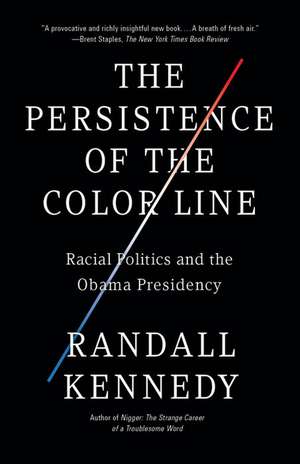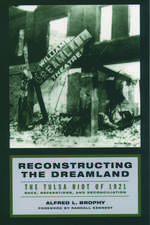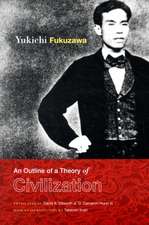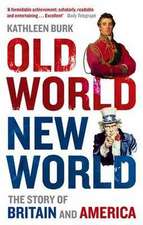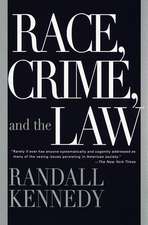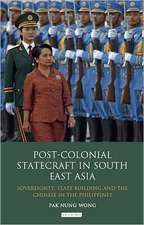The Persistence of the Color Line: Racial Politics and the Obama Presidency
Autor Randall Kennedyen Limba Engleză Paperback – 31 mar 2012
Kennedy tackles such hot-button issues as the nature of racial opposition to Obama; whether Obama has a singular responsibility to African Americans; the differences in Obama’s presentation of himself to blacks and to whites; the challenges posed by the dream of a post-racial society; the increasing irrelevance of a certain kind of racial politics and its consequences; the complex symbolism of Obama’s achievement and his own obfuscations and evasions regarding racial justice.
Eschewing the critical excesses of both the left and the right, Kennedy offers an incisive view of Obama’s triumphs and travails, his strengths and weaknesses, as they pertain to the troubled history of race in America.
Preț: 122.64 lei
Nou
Puncte Express: 184
Preț estimativ în valută:
23.47€ • 24.55$ • 19.49£
23.47€ • 24.55$ • 19.49£
Carte disponibilă
Livrare economică 12-26 martie
Preluare comenzi: 021 569.72.76
Specificații
ISBN-13: 9780307455550
ISBN-10: 0307455556
Pagini: 322
Dimensiuni: 133 x 202 x 19 mm
Greutate: 0.25 kg
Editura: VINTAGE BOOKS
ISBN-10: 0307455556
Pagini: 322
Dimensiuni: 133 x 202 x 19 mm
Greutate: 0.25 kg
Editura: VINTAGE BOOKS
Recenzii
“[A] provocative and richly insightful new book . . . A breath of fresh air.” —Brent Staples, The New York Times Book Review
“[A] powerful and ruminative book. . . . [Kennedy] has long been among the most incisive American commentators on race. His books . . . seem to be carved from intellectual granite, yet they have human scale. . . . So resonant and so personal. . . . Pay attention too to this book’s many ringing sentences.” —Dwight Garner, The New York Times
“Kennedy is an unusual writer on the difficult and divisive subject of race. His voice is measured, calm. He can discuss highly emotional issues with detachment. But underneath there is an unmistakable passion: for truth, for justice.” —Anthony Lewis, The New York Review of Books
“Kennedy has created a valuable historical document—both for those of us who lived through the 2008 election and would welcome a more academic perspective on it, and for those who one day will look back and wonder what people were talking about.” —The Christian Science Monitor
“[Kennedy] deftly sketches both the infighting among Democrats in the primary season that pitted two strong candidates with equal yet opposing ‘first’ aspirations, as well as the ugly history of race-baiting that winds through American politics from the country’s birth. At times Kennedy’s plainspoken facts seem almost shocking, so degraded has much of our conversation about history become.” —The Boston Globe
“Those who believe Barack Obama’s election signaled a final triumph over racism will learn much from Harvard law professor Randall Kennedy, whose writings on race in America have delighted and provoked many. . . . Kennedy presents convincing evidence that race remains a dominant focus of American political consciousness.” —Tikkun
“[A] challenging new book.” —Richmond Times-Dispatch
“Kennedy turns his kaleidoscopic perspective on race in America upon an engrossing and nuanced analysis of ‘the racial issues that have surrounded Obama’s election and presidency.’ . . . Challenging knee-jerk responses—from the left, right, center, and fringe . . . he manages to look beyond race without overlooking race, placing events in a historical political context. . . . Both provocative and informative, arguable and absorbing.” —Publishers Weekly
“A carefully calculated, sober discussion of why race will continue to haunt American politics.” —Kirkus
“[A] powerful and ruminative book. . . . [Kennedy] has long been among the most incisive American commentators on race. His books . . . seem to be carved from intellectual granite, yet they have human scale. . . . So resonant and so personal. . . . Pay attention too to this book’s many ringing sentences.” —Dwight Garner, The New York Times
“Kennedy is an unusual writer on the difficult and divisive subject of race. His voice is measured, calm. He can discuss highly emotional issues with detachment. But underneath there is an unmistakable passion: for truth, for justice.” —Anthony Lewis, The New York Review of Books
“Kennedy has created a valuable historical document—both for those of us who lived through the 2008 election and would welcome a more academic perspective on it, and for those who one day will look back and wonder what people were talking about.” —The Christian Science Monitor
“[Kennedy] deftly sketches both the infighting among Democrats in the primary season that pitted two strong candidates with equal yet opposing ‘first’ aspirations, as well as the ugly history of race-baiting that winds through American politics from the country’s birth. At times Kennedy’s plainspoken facts seem almost shocking, so degraded has much of our conversation about history become.” —The Boston Globe
“Those who believe Barack Obama’s election signaled a final triumph over racism will learn much from Harvard law professor Randall Kennedy, whose writings on race in America have delighted and provoked many. . . . Kennedy presents convincing evidence that race remains a dominant focus of American political consciousness.” —Tikkun
“[A] challenging new book.” —Richmond Times-Dispatch
“Kennedy turns his kaleidoscopic perspective on race in America upon an engrossing and nuanced analysis of ‘the racial issues that have surrounded Obama’s election and presidency.’ . . . Challenging knee-jerk responses—from the left, right, center, and fringe . . . he manages to look beyond race without overlooking race, placing events in a historical political context. . . . Both provocative and informative, arguable and absorbing.” —Publishers Weekly
“A carefully calculated, sober discussion of why race will continue to haunt American politics.” —Kirkus
Notă biografică
Randall Kennedy is the Michael R. Klein Professor of Law at Harvard Law School. He received his undergraduate degree from Princeton and his law degree from Yale. He attended Oxford University as a Rhodes Scholar and is a former clerk to Supreme Court Justice Thurgood Marshall. He is the author of Race, Crime, and the Law, a winner of the Robert F. Kennedy Book Award; Interracial Intimacies: Sex, Marriage, Identity, and Adoption; Nigger: The Strange Career of a Troublesome Word; and Sellout: The Politics of Racial Betrayal. He lives in Massachusetts.
Extras
Introduction
The terms under which Barack Obama won the presidency, the conditions under which he governs, and the circumstances under which he seeks reelection all display the haunting persistence of the color line. Many prophesied or prayed that his election heralded a postracial America. But everything about Obama is widely, insistently, almost unavoidably interpreted through the prism of race—his appearance (light-skinned), his demeanor (not an angry black man), his diction (“articulate,” “no Negro dialect”), his spouse (dark-skinned), the support he enjoys (anchored by blacks), the opposition he encounters (constituted overwhelmingly by whites).
For Obama himself, the consciousness of race is ever-present. It was evident on Election Night when he remarked on the miraculousness of an African American winning the White House. It was evident at the inauguration when he alluded to the fact that, during his father’s lifetime, bigotry denied blacks service in Washington, D.C., restaurants. It was evident at the press conference of December 7, 2010, when, defending hotly disputed tax legislation, he maintained that compromise was central to America, including the Founding Fathers’ compromise with slavery—a bargain that some thoughtful observers have condemned as immoral.
There was a time—now it seems long ago—when it appeared, momentarily, that America had taken a giant stride toward redemption. After all, the electorate selected Barack Hussein Obama, a black man, to be president of the United States. The hope, pride, relief, and astonishment generated by this unprecedented event provoked all sorts of optimistic declarations. People who had, in emotional self- defense, habitually eschewed patriotism, now waved American flags enthusiastically. People who had doubted that Americans would ever be able to overcome racial alienation now believed that they could. Expressions of exhilaration produced sounds and scenes reminiscent of reactions to such landmark events as the Emancipation Proclamation, Joe Louis’s victory over Max Schmeling; the “I Have a Dream” speech of Martin Luther King, Jr.; and the landing on the moon. Parties erupted featuring such anthems as “Ain’t No Stoppin’ Us Now,” “A Change is Gonna Come,” and “We’re a Winner.” Strangers danced and cried with one another. People named newborns after the president-elect. On the day after the election, one of my students at Harvard Law School tearfully declared that in light of Obama’s election she was reconsidering her career plans. His example, she said, made her want to be a better person. A few days later, I received a letter from an inmate of a maximum-security prison in Indiana that said the same thing.
On Election Night one heard repeatedly echoes of Maya Angelou’s statement “I never thought I’d see a black president in the White House in my lifetime.” Oprah Winfrey exclaimed that Election Night was “the most electrifying” moment she had ever experienced. People commonly remarked that they felt as if they were dreaming. The day after the election, on a Listserv organized by racial- minority law professors, a distinguished black jurist remarked, “When I woke up this morning, I said to my husband, ‘I had the weirdest dream last night. I dreamed that a black man named Barack Hussein Obama became president of the United States. Is that weird or what?’ ”
Blacks were not the only ones feeling and expressing pent-up emotion. Responding to a column in which the black journalist Eugene Robinson explained why he wept on Election Night, numbers of white readers noted that they, too, had been moved to tears. In an open “Letter to a New Neighbor,” Washingtonian Betsy Karasik poured out feelings of gratitude:
You proved that Americans are not nearly as narrow-minded as most of us believed; that speaking to us adult-to-adult about race trumps playing the race card; that sticking to the issues and taking the high road do not make you a sucker; that being an intellectual is not a liability . . . and that appealing to the best in people brings out the young, the old, the dissatisfied, minorities and even the opposition in record numbers.
In newspapers and Web sites people posted messages by the thousands displaying ways in which Obama’s victory deeply moved them. A reader of The Washington Post wrote, “We still have a long way to go to erase the sin of slavery and end racism. But maybe, just maybe, this is the beginning of the end of race as a major issue. Today, I can truly say, God Bless America, and mean it.” A reader of The New York Times stated that Obama’s election “does nothing less for me than heal my chronic young boyhood wound of November 22, 1963”—the assassination of President John F. Kennedy. “And also the wounds of Bobby and Martin”—the assassinations of Robert F. Kennedy and Martin Luther King, Jr., in the spring of 1968. A reader of the Web site Jack & Jill Politics wrote, “This morning I woke up and realized that what I saw last night was not a dream. . . . I realized I woke up in a new time, in a new era. I woke up in A.B.—After Barack.”
Euphoric statements made in the grip of the postelection high are painful (and sometimes embarrassing) to recall. Even seasoned observers were swept up by a delusionary millenarianism. Many racial Panglossians, however, have been sobered by realities—the substantial number of Americans who simply refuse to acknowledge Obama’s political legitimacy (for example, the allegation believed by tens of millions that he was born abroad), the open contempt displayed by antagonists not only on the airwaves of right-wing talk radio but also in the inner sanctum of Congress (for example, Joe Wilson’s infamous shout of “You lie!”), and the stark polarization that characterizes the racial demographics of support for and opposition to Obama. That the opposition is overwhelmingly white is a fact that no one can reasonably dispute. What is disputed, however, is that racial sentiment is an important ingredient in the opposition. “America has turned the page on race,” wrote a correspondent for The Economist. “The electorate may be divided by race, but no longer mainly because of race.”
It is, of course, true that there are many potential nonracial reasons for rejecting Obama, including disagreement with his domestic policies (his stance on abortion, financial regulation, immigration, taxation, etc.), foreign policy (his prosecution of the wars in Iraq and Afghanistan, for instance), and also objections to Obama himself. Even some who formerly supported him enthusiastically have subsequently voiced doubts about his mettle as a leader. Racial sentiments, moreover, are devilishly difficult to isolate and quantify in specific instances. In gross, however, the evidence is overwhelming, that racial attitudes affect judgments pervasively—from the administration of justice to support or opposition to social welfare programs, to dating and the marriage market, to employment decisions. African Americans, for in stance, are not only discriminated against in many settings; they are more discriminated against the blacker they are perceived to be. Against that backdrop, it is wholly implausible to think that racial attitudes would not significantly affect assessments of politicians.
That Obama won the White House in 2008 does not mean that racial prejudice is no longer a potent force in American politics. The political scientists Michael Tesler and David O. Sears argue persuasively that the election of 2008 “was anything but postracial. Instead, the racial hopes and fear evoked by [Obama’s] potential to become the country’s first black president sharply divided racial conservatives from racial liberals. Public opinion and voting behavior . . . were considerably more polarized by racial attitudes than at any other time on record.” Racial attitudes, they conclude, are “one of the most important determinants of how the American public responded.” Racial liberals supported Obama more than they would have backed an ideologically similar white candidate while racial conservatives opposed Obama more than they would have opposed an ideologically similar white candidate. Furthermore, there are some who voted for Obama in 2008 despite their disinclination to vote for a black candidate. It should be unsurprising that they would turn against him more quickly and sharply than they would have done under identical circumstances if he were white.
The 2008 postelection racial euphoria stemmed from an array of sources, including denial of the breadth, depth, and subtlety of racial divisions in American life. Despite the epochal nature of the election, it should have been understood from the outset that something as thoroughly ingrained as American racial prejudice, particularly its antiblack variant, would not suddenly dissipate despite the goodwill effectively summoned by Obama’s skillful campaign. Much of what he had to surmount in order to win was rooted in America’s racial traumas. He had to overcome doubts lodged deep in the psyches of blacks, some of whom were so afraid of the lengths to which they thought whites would go to prevent the election of a black president that early on they refrained from supporting him, convinced that he would be assassinated if he emerged as a serious contender. He had to overcome Negrophobia that made it difficult, if not impossible, for some whites to vote in favor of entrusting a black man with the fate of the nation—regardless of the caliber of the white alternatives. A wide variety of biases confronted Obama—from paranoia about his origins and loyalties, to resentment that made a black man’s ambition appear inappropriately “uppity,” to a hypercritical attitude that magnified his perceived missteps, to lowered expectations that revealed the dismal image many observers have when they think of black politicians. When Senator Joseph Biden mused early in the campaign season that Obama was “the first mainstream African American [running for president] who is articulate and bright and clean,” he was simply giving voice to a widespread perception. Obama, moreover, had to overcome the taint of a long association with an Afrocentric spiritual adviser whom the country saw screaming from a pulpit “God damn America!” He had to overcome fear that the Democrats would once again “blow” a winnable presidential contest—this time by nominating a candidate who, partly because of his race, would be unable to persuade working-class whites to vote for him. He had to overcome detractors who complained that he is not black enough as well as those who complained that his wife is too black.
The terms under which Barack Obama won the presidency, the conditions under which he governs, and the circumstances under which he seeks reelection all display the haunting persistence of the color line. Many prophesied or prayed that his election heralded a postracial America. But everything about Obama is widely, insistently, almost unavoidably interpreted through the prism of race—his appearance (light-skinned), his demeanor (not an angry black man), his diction (“articulate,” “no Negro dialect”), his spouse (dark-skinned), the support he enjoys (anchored by blacks), the opposition he encounters (constituted overwhelmingly by whites).
For Obama himself, the consciousness of race is ever-present. It was evident on Election Night when he remarked on the miraculousness of an African American winning the White House. It was evident at the inauguration when he alluded to the fact that, during his father’s lifetime, bigotry denied blacks service in Washington, D.C., restaurants. It was evident at the press conference of December 7, 2010, when, defending hotly disputed tax legislation, he maintained that compromise was central to America, including the Founding Fathers’ compromise with slavery—a bargain that some thoughtful observers have condemned as immoral.
There was a time—now it seems long ago—when it appeared, momentarily, that America had taken a giant stride toward redemption. After all, the electorate selected Barack Hussein Obama, a black man, to be president of the United States. The hope, pride, relief, and astonishment generated by this unprecedented event provoked all sorts of optimistic declarations. People who had, in emotional self- defense, habitually eschewed patriotism, now waved American flags enthusiastically. People who had doubted that Americans would ever be able to overcome racial alienation now believed that they could. Expressions of exhilaration produced sounds and scenes reminiscent of reactions to such landmark events as the Emancipation Proclamation, Joe Louis’s victory over Max Schmeling; the “I Have a Dream” speech of Martin Luther King, Jr.; and the landing on the moon. Parties erupted featuring such anthems as “Ain’t No Stoppin’ Us Now,” “A Change is Gonna Come,” and “We’re a Winner.” Strangers danced and cried with one another. People named newborns after the president-elect. On the day after the election, one of my students at Harvard Law School tearfully declared that in light of Obama’s election she was reconsidering her career plans. His example, she said, made her want to be a better person. A few days later, I received a letter from an inmate of a maximum-security prison in Indiana that said the same thing.
On Election Night one heard repeatedly echoes of Maya Angelou’s statement “I never thought I’d see a black president in the White House in my lifetime.” Oprah Winfrey exclaimed that Election Night was “the most electrifying” moment she had ever experienced. People commonly remarked that they felt as if they were dreaming. The day after the election, on a Listserv organized by racial- minority law professors, a distinguished black jurist remarked, “When I woke up this morning, I said to my husband, ‘I had the weirdest dream last night. I dreamed that a black man named Barack Hussein Obama became president of the United States. Is that weird or what?’ ”
Blacks were not the only ones feeling and expressing pent-up emotion. Responding to a column in which the black journalist Eugene Robinson explained why he wept on Election Night, numbers of white readers noted that they, too, had been moved to tears. In an open “Letter to a New Neighbor,” Washingtonian Betsy Karasik poured out feelings of gratitude:
You proved that Americans are not nearly as narrow-minded as most of us believed; that speaking to us adult-to-adult about race trumps playing the race card; that sticking to the issues and taking the high road do not make you a sucker; that being an intellectual is not a liability . . . and that appealing to the best in people brings out the young, the old, the dissatisfied, minorities and even the opposition in record numbers.
In newspapers and Web sites people posted messages by the thousands displaying ways in which Obama’s victory deeply moved them. A reader of The Washington Post wrote, “We still have a long way to go to erase the sin of slavery and end racism. But maybe, just maybe, this is the beginning of the end of race as a major issue. Today, I can truly say, God Bless America, and mean it.” A reader of The New York Times stated that Obama’s election “does nothing less for me than heal my chronic young boyhood wound of November 22, 1963”—the assassination of President John F. Kennedy. “And also the wounds of Bobby and Martin”—the assassinations of Robert F. Kennedy and Martin Luther King, Jr., in the spring of 1968. A reader of the Web site Jack & Jill Politics wrote, “This morning I woke up and realized that what I saw last night was not a dream. . . . I realized I woke up in a new time, in a new era. I woke up in A.B.—After Barack.”
Euphoric statements made in the grip of the postelection high are painful (and sometimes embarrassing) to recall. Even seasoned observers were swept up by a delusionary millenarianism. Many racial Panglossians, however, have been sobered by realities—the substantial number of Americans who simply refuse to acknowledge Obama’s political legitimacy (for example, the allegation believed by tens of millions that he was born abroad), the open contempt displayed by antagonists not only on the airwaves of right-wing talk radio but also in the inner sanctum of Congress (for example, Joe Wilson’s infamous shout of “You lie!”), and the stark polarization that characterizes the racial demographics of support for and opposition to Obama. That the opposition is overwhelmingly white is a fact that no one can reasonably dispute. What is disputed, however, is that racial sentiment is an important ingredient in the opposition. “America has turned the page on race,” wrote a correspondent for The Economist. “The electorate may be divided by race, but no longer mainly because of race.”
It is, of course, true that there are many potential nonracial reasons for rejecting Obama, including disagreement with his domestic policies (his stance on abortion, financial regulation, immigration, taxation, etc.), foreign policy (his prosecution of the wars in Iraq and Afghanistan, for instance), and also objections to Obama himself. Even some who formerly supported him enthusiastically have subsequently voiced doubts about his mettle as a leader. Racial sentiments, moreover, are devilishly difficult to isolate and quantify in specific instances. In gross, however, the evidence is overwhelming, that racial attitudes affect judgments pervasively—from the administration of justice to support or opposition to social welfare programs, to dating and the marriage market, to employment decisions. African Americans, for in stance, are not only discriminated against in many settings; they are more discriminated against the blacker they are perceived to be. Against that backdrop, it is wholly implausible to think that racial attitudes would not significantly affect assessments of politicians.
That Obama won the White House in 2008 does not mean that racial prejudice is no longer a potent force in American politics. The political scientists Michael Tesler and David O. Sears argue persuasively that the election of 2008 “was anything but postracial. Instead, the racial hopes and fear evoked by [Obama’s] potential to become the country’s first black president sharply divided racial conservatives from racial liberals. Public opinion and voting behavior . . . were considerably more polarized by racial attitudes than at any other time on record.” Racial attitudes, they conclude, are “one of the most important determinants of how the American public responded.” Racial liberals supported Obama more than they would have backed an ideologically similar white candidate while racial conservatives opposed Obama more than they would have opposed an ideologically similar white candidate. Furthermore, there are some who voted for Obama in 2008 despite their disinclination to vote for a black candidate. It should be unsurprising that they would turn against him more quickly and sharply than they would have done under identical circumstances if he were white.
The 2008 postelection racial euphoria stemmed from an array of sources, including denial of the breadth, depth, and subtlety of racial divisions in American life. Despite the epochal nature of the election, it should have been understood from the outset that something as thoroughly ingrained as American racial prejudice, particularly its antiblack variant, would not suddenly dissipate despite the goodwill effectively summoned by Obama’s skillful campaign. Much of what he had to surmount in order to win was rooted in America’s racial traumas. He had to overcome doubts lodged deep in the psyches of blacks, some of whom were so afraid of the lengths to which they thought whites would go to prevent the election of a black president that early on they refrained from supporting him, convinced that he would be assassinated if he emerged as a serious contender. He had to overcome Negrophobia that made it difficult, if not impossible, for some whites to vote in favor of entrusting a black man with the fate of the nation—regardless of the caliber of the white alternatives. A wide variety of biases confronted Obama—from paranoia about his origins and loyalties, to resentment that made a black man’s ambition appear inappropriately “uppity,” to a hypercritical attitude that magnified his perceived missteps, to lowered expectations that revealed the dismal image many observers have when they think of black politicians. When Senator Joseph Biden mused early in the campaign season that Obama was “the first mainstream African American [running for president] who is articulate and bright and clean,” he was simply giving voice to a widespread perception. Obama, moreover, had to overcome the taint of a long association with an Afrocentric spiritual adviser whom the country saw screaming from a pulpit “God damn America!” He had to overcome fear that the Democrats would once again “blow” a winnable presidential contest—this time by nominating a candidate who, partly because of his race, would be unable to persuade working-class whites to vote for him. He had to overcome detractors who complained that he is not black enough as well as those who complained that his wife is too black.
